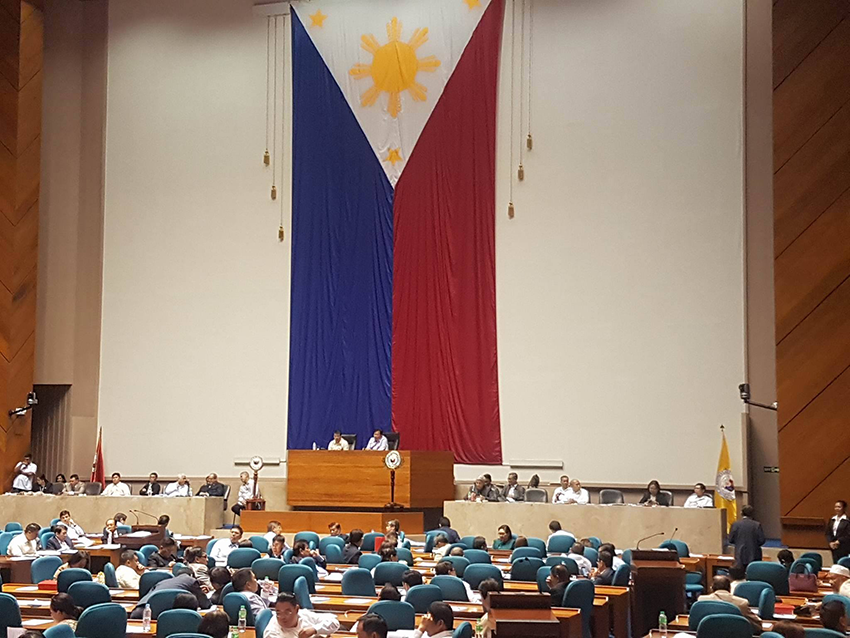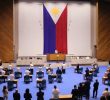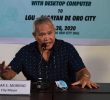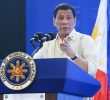
House of Representatives (File photo / davaotoday.com)
DAVAO CITY, Philippines—Congress approved on Tuesday, September 12, the proposed P3.767 trillion national budget for fiscal year 2018.
The national budget for 2018 is 12.4 percent higher compared to last year’s budget amounting to 21.6 percent of gross domestic product, a statement from Department of Budget and Management (DBM) said.
DBM said the proposed P3.767 trillion 2018 national budget “will support the government’s objectives of achieving robust and inclusive growth of 7 to 8 percent in 2018.”
Over the past week, government agencies defended their respective budgets in the plenary debates at the Committee level of the House of Representatives.
“Being a strong articulation of the government’s pro-growth and pro-poor policy, we ought to keep an eye on the National Budget. It embodies no less than the collective needs, hopes, and aspirations of our people,” DBM Secretary Benjamin Diokno said in a statement on Tuesday, September 12.
Diokno also expressed optimism that Congress will be able to pass the General Appropriations bill as he welcomed the passage of the 2018 national budget.
The Lower House-approved General Appropriations Bill will then be transmitted to the Senate, where Committee-level deliberations have also begun on the 2018 Budget, he said.
A Bicameral Conference Committee will then be convened by the Senate and Congress to reconcile disparities between their respective versions of the General Appropriations Bill.
No benefit for the poor
But a militant lawmaker described the 2017 budget as “paasa” (giving false hope) and “exploitative” to poor Filipinos.
Anakpawis Partylist Representative Ariel Casilao said the budget will not benefit the poor and the marginalized.
“It had no prospect of resolving the archaic problem of landlessness hounding tens of millions of farmers, promises no wage increase for the ordinary worker, decent mass housing for the urban poor and espoused messianic outlook of foreign investments as key to national development,” he said.
Casilao said the P10-billion budget for the Department of Agrarian Reform is devoted in concluding the implementation of the Republic Act No. 6657 Comprehensive Agrarian Reform Program (CARP), “that only involved 4.7 million hectares and 2.8 million beneficiaries since the implementation of Presidential Decree 27 in 1972.”
Casilao said the budget will not cover new lands to benefit more farmers across the country.”
He said the budget has no categorical or definite indication that the wages of ordinary Filipino workers will increase and the government is only relying on the entry of foreign investments for labor demand to increase.
Casilao added that the 2018 budget is geared into “attracting foreign investments” through the government’s Build, Build, Build program and this, he claimed, will only worsen contractualization of labor and labor flexibility.
The lawmaker cited that the country’s ranking for flexible labor increased from 96 of 140 to 87, from period 2014-2015 to 2015-2016, based on reports of World Economic Forum on Global Competitiveness.
Government data shows that 2015 foreign direct investments reached to $5.8 billion in 2015, from which $3.2 billion were debt instruments. But with these investments, Casilao said the national economy remains indebted that reached to $74.7 billion in 2016, with public debt amounting to $33.5 billion.
Meanwhile, Appropriations Committee Chairperson, Karlo Alexei Nograles, urged lawmakers to carefully examine every peso that went into the programs, activities, and projects of the government.
“At the end of the day, we want to pass a national budget that is just and attuned to the people’s needs,” Nograles said. (davaotoday.com)
Ariel Casilao, house of representatives, Karlo Alexei Nograles, Philippine budget









